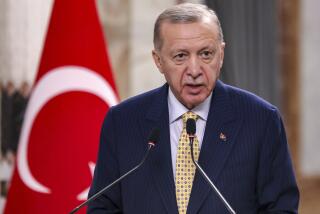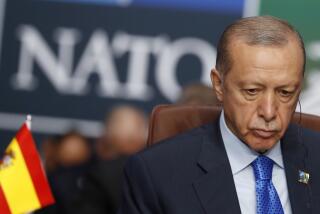EU Should Embrace Turkey
- Share via
At a moment when Islam and the West seem about to regress to the blood-soaked past, the European Union has a chance to encourage peace by inching open its doors to a predominantly Muslim democracy.
The union’s 15 nations meet today and Thursday in Copenhagen to consider expansion. They will invite 10 nations to join. Turkey isn’t among them, but that secular state will be the hottest item on the agenda.
Although only 3% of Turkey’s 297,000 square miles lie in Europe, west of the Bosporus Strait, NATO admitted the nation in 1952. Fifty years later, the EU’s leaders should start things rolling for Turkey to join their exclusive club as well.
Getting to that point would be risky, complicated and time-consuming -- but worth the effort. In 1999, when the union first declared Turkey a candidate for membership, it established a rigorous criterion. First the nation, with its history of torturing dissidents and slaughtering ethnic minorities, would have to respect human rights.
The government in Ankara already has abolished the death penalty and given its Kurdish minority more freedoms. That’s not enough. A smart move now would be to free several Kurdish politicians expelled from Parliament in 1995 and kept imprisoned ever since after an infamously unfair trial.
Then Ankara should change course and support the deal that U.N. Secretary-General Kofi Annan brokered to reunite the rival Greek and Turkish sides of the disputed island of Cyprus. At the summit in Copenhagen, the EU will invite the Greek Cypriot side of Cyprus to join in 2004. But the union would prefer to admit a united Cyprus, governed by a Swiss-style confederation with broad power-sharing.
The controversy surrounding the prospect of Turkey’s admission to the union does not end, however, with human rights or Cyprus. Former French President Valery Giscard d’Estaing, who now presides over the Convention on the Future of Europe, has questioned the European identity of Turkey and its adherence to Western values.
Yes, Ankara is in Asia. But the country’s most visible and magnificent landmarks -- the Blue Mosque, the St. Sophia Cathedral -- are fully anchored in Europe. And Turkey’s strategic location as a gateway between continents could play a key role in European security and defense.
One more thing. Opening the European door to negotiations with a moderate secular government in a mostly Muslim Turkey might nudge other Muslim countries toward democratic values and further undermine the debatable notion that a “clash of civilizations” is at hand.
More to Read
Sign up for Essential California
The most important California stories and recommendations in your inbox every morning.
You may occasionally receive promotional content from the Los Angeles Times.













